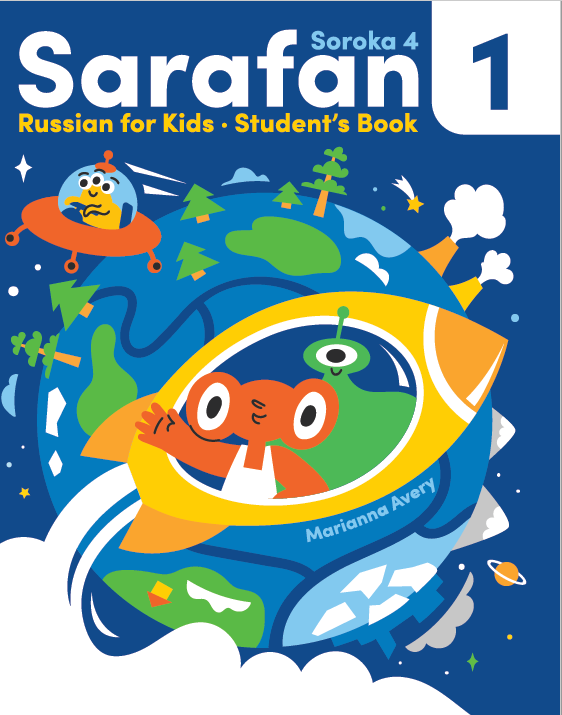Language Focus:
НЕТ – No
Пожалуйста, встаньте! – Please stand up!
Стой! – Stop!
Review/Warm-up
Review the phrases of greetings and introduction. Address some students with the following words: “Привет, я … Как тебя зовут?”

Language Focus:
НЕТ – No
Пожалуйста, встаньте! – Please stand up!
Стой! – Stop!
Review/Warm-up
Review the phrases of greetings and introduction. Address some students with the following words: “Привет, я … Как тебя зовут?”

LANGUAGE FOCUS:
“Алфавит (строчные буквы).” (Alphabet, lowercase letters)
Words, Phrases, and Translation:
Входите, пожалуйста! – Come in, please!
Молодец! – Well done!
Все вместе! – All together!
Кто это? – Who is that?
Это Ваня. – This is Vanya.
Continue reading “Parent's Manual. Unit 1 Lesson 2”The “Sarafan” book series is the next level after the “Soroka: Russian for Kids” series, designed to follow the Soroka 3 level. It is presented in the same format: a Student’s Book, Activity Book and Teacher’s Book, all of which dovetail with each other.

Language Focus:
“Introduction, greetings, and saying ‘Goodbye’
Words, Phrases, and Translation:
Привет, я Вика. – Hello, I am Vika.
Как тебя зовут? – What is your name?
Пока! – Bye!
Смотри(те)! – Look!
Слушай(те)! – Listen!
Continue reading “Parent's Manual. Unit 1 Lesson 1”In the manual, you are going to find lesson planning. Partially it is going to be the same as it is in the Soroka 1 manual for teachers. For this manual, I did not include the exercises/activities that can be completed in a group setting. Furthermore, I would like to note that the difference will be that the manual, which you are reading now, is geared toward individual/one-on-one lessons with children regardless of whether the parents or teachers conduct the lessons. However, I am going to focus my attention on parents, for they have less experience and need to be guided/assisted more.

We set up the goals. Now let us look at the schedule. I am going to describe an individual situation, and it is up to you to apply it to yourself, agreed? Examine your schedule and the schedule of your child. When are you both free and when can you both sit down and study in a peaceful manner? It is necessary to have this time when nobody disturbs and bothers you. Do you have this time during the week? Mark it on your calendar. I would like you to study 2- 3 times a week, about 35-40 minutes every time. It is not necessary to make the lessons long. First, you do not have time, and second, your child gets tired. Your language lessons must be on a regular basis in accordance with the schedule. Remember to have short and frequent lessons
Continue reading “Manual for Parents. Part 2”This is such a long title. What for? It is done to invite conversation among people who are interested. This absolutely does not mean that others cannot join. On the contrary, it is necessary! When I write, I always think about my companion. This time in my mind it is YOU. Yes-yes! It is you. You are the mother who is living abroad and wants her child to speak Russian. Is that right? Wherever you are, you do not have the teachers you want. Or you do not like their curriculum. It is necessary to get down to work by yourself.

We continue with the translation of the Teacher’s Book for the Soroka 1 Russian for Kids course, with our last Lesson of Unit 3.
You may sample the Student’s Book and Activity Book pages on my website.
In this lesson we are learning
Plurals nouns and plural verbs
Review / Warm-up
“Chain – drills.” We practice a question–and-answer: “Сколько тебе лет? – Мне 8 лет.” (“How old are you?” – “I am 8 years old.”)
Continue reading “Unit 3. Lesson 3.”Last time in my blog I gave you a translation into English of Unit 3 Lesson 1 of the Teacher’s Book. Now we go on, with the translation of Unit 3 Lesson 2.
Here are the links to the samples of the Student’s Book and Activity Book on my website.
In this lesson we are learning
Age: “How old are you?” “I am 8 years old.” (“Сколько тебе лет?” “Мне восемь лет.”)
Review / Warm-up
A teacher points at numbers from 1 to 10 and reads them out loud. Students repeat after the teacher, initially all students at once, then each student one at a time.
Reading by syllables
Continue reading “Unit 3. Lesson 2.”The translation of my Teacher’s Book has started. I will publish one chapter after another when they are ready, and finally I will publish the whole Teacher’s Book in English.
I am doing that because I have a lot of requests from English-speaking teachers.
The Teacher’s Book can be very useful for you, because it gives you the complete instructions on how to use the Soroka course. Please refer to the pages in the Student’s Book and Activity Book that I mention in the instructions. They are available on my website.
Usually I recommend studying a unit in three lessons.
Here we go.
Continue reading “Teacher’s Book Soroka 1. Unit 3.”